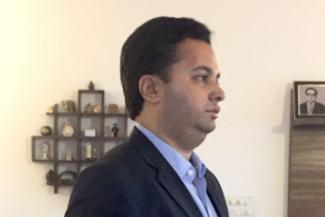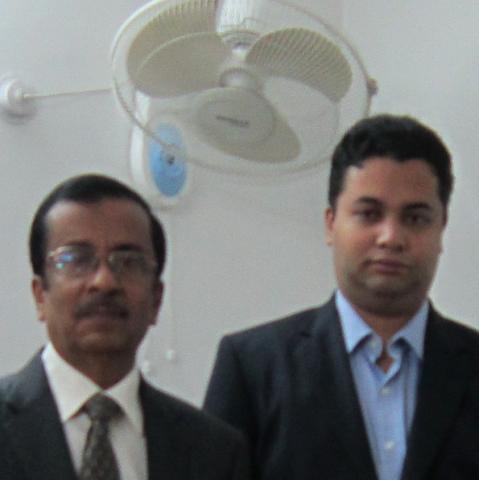
Ajit Bharathan from Mysore talks about his son Amar, who is on the autism spectrum, the changes his wife and he made to help Amar become independent and a committed worker, valued by his employer.
Please tell us a bit about your son.
Amar was born in Abu Dhabi, U.A.E, in 1986. He is autistic. He is quite well built, tall and almost 6 feet. He is independent but lacks speech even though he has reasonably good comprehension and follows simple commands. He has difficulty in forming sentences.
What were the early symptoms?
He was diagnosed at threee. He had difficulty in talking, lack of eye contact and was unable to respond when his name was called. We thought it was due to some hearing problem. He was also hyperactive.
Please describe your experience of managing the condition?
Initially it was extremely difficult to manage him. He was restless, hyper active and also had temper tantrums. He used to go to a special school in Dubai but later he, his mother and brother shifted to Mysore while I continued to stay in the Gulf. They moved to Mysore basically to undergo speech therapy after conducting audiometry tests at The All India Institute of Speech and Hearing (AIISH). Luckily, we found that his hearing was normal. He was admitted to a special school here in Mysore and simultaneously he was undergoing speech therapy at AIISH. Later on, as he grew up his behavior problems increased. He became quite aggressive and my wife was finding it more and more difficult to manage him. That is the time I decided to quit my job in Sharjah and come back to India. The problems did not stop and it continued for another 2 years.
In the meantime, our parents organisation in which I was active explored the possibility of keeping them engaged productively by seeking mainstream employment. It was very challenging and most of the companies which we approached were not ready to employ people with intellectual and developmental disabilities (PwIDD). The management of the companies were averse to the idea of keeping them all alone and unattended.
Finally, we approached a company called Kaynes Technologies which was engaged in the assembly of printed circuit boards (PCB) with a proposal to employ a group of PwIDD’s with a mentor to act as a link between the PwIDD’s and the management. Luckily this proposal clicked and the management agreed to employ a group of 9 PwIDD’s and a mentor. Amar is paid a salary at par with normal employees as per the labour act. He is given all benefits like Employees State Insurance, provident fund etc.
He was very happy to receive his first salary and proudly displayed it to his mother. He likes to dine out when he gets his salary. He loves his work to which he is fully focused and committed and whatever work is assigned to him is completed within no time. He executes the work much faster than the normal employees. If there is any work to be completed on an urgent basis, then the work is assigned to Amar by his supervisor. That is the trust the management has on Amar. He gets bonus every year. My son today has completed 6 long years at Kaynes Technologies and we are proud of him. There are many who refuse to believe that Amar is employed.
Amar says:
"I'm elated when I'm traveling to another city. I plan and pack well in advance to ensure I enjoy every moment"
Is your son on any medication? If so, could you tell us what they are? Did the medicines help in any way?
He was on medication for issues related to behavior and also obsession with certain things. He was on Resperidone. Yes the medicines did help in controlling his hyperactivity.
Were there any side-effects of the medicines?
Nothing we could observe except for the fact that he put on weight
What were the challenges you faced while looking after your son?
It was really challenging for me, my wife Ajitha and my second son Atul who also used to take care of him well. It is also a fact that much of our time was devoted to Amar and we could not give the care to Atul that we would have liked to. But Atul was very understanding and he is now employed with a decent job in Bangalore. Amar waits for Atul to return every weekend from Bangalore where he is currently employed.
How did you ensure that he has a life which is as close to normal as possible?
Amar always had an organized lifestyle. He was disciplined, systematic, used to follow a fixed pattern and was very punctual. Ajitha was of the view that a bit of physical activity would help Amar in improving is comprehension and overall IQ. So he was taught swimming, skating, cycling, dancing, morning and evening walks etc. This kept Amar engaged and considerably helped improve his social skills. I must add that Amar is an excellent swimmer.
The challenge was to make him independent. The initial training for self help skills was given at the psychiatry unit at Nambikanilayam, Christian Medical College and Hospital, Vellore, Tamil Nadu, India. He picked up certain life skills during his time in Special Schools.
Many contributed in helping groom Amar and we had tremendous support from all of them when the future looked extremely bleak. The teachers at Amar’s school were very understanding and helpful. My siblings, in-laws and other relatives were all very supportive. His Yoga instructor, music teacher, parents of our support group, colleagues and management of Kaynes Technologies, neighbours of our community where we live and last but not the least his grandparents also played prominent roles in his steady progress.
At present, we have a God sent buddy in Linish who understands Amar’s needs and desires. Both of them go out shopping, watch movies and eat at restaurants together. Amar makes the shopping list, picks the groceries from the shelf as per the list and finally makes payment at the cash counter. Today, he knows the concept and value of money. Linish is hopeful and committed to taking Amar to the next level. We are really grateful to all of them. My wife always says that God has hand picked them and send them to us.
How did you prepare him for a work life?
Pre employment training was provided in the use of hand tools under a qualified trainer. This helped to a great extent in improving his hand eye coordination. He was also provided job specific training.
What were the challenges he faced when he stepped out into the outside world as opposed to being in the confines of his home? How did he overcome them?
Actually it was a smooth transition and there was no difficulty at all when he started working. We felt he was quite excited to take up employment and there was no pressure from us parents at all. For Amar it was something which came up naturally. We found him always enthusiastic and committed in his new role.
Would you say your son is different in handling the challenges of life from others with autism? If so, in what way?
Yes, I would say so. He was different from some of the others with Autism, especially in terms with behaviour problem. This is perhaps the care we took of him as well as understanding his needs and wishes and trying to fulfill them as best as we can.
What kind of specialists do you consult and how often?
Psychiatrist, Ayurvedic treatment. For the last 3 years we have not consulted any Specialists
Have you had to make changes to your lifestyle?
Yes, me and my wife, both had to make significant changes in our lifestyle. My wife, a qualiified Medical Practitioner, could take up employment only after Amar was 20 years old. As for me I had to leave my job to look after Amar and it was after this that my wife Ajitha started working.
Like all other parents it was also very difficult to emotionally cope with Amar’s condition and accept reallity.
Is there any personal anecdote that you would like to share with us?
As a part of the educational process and while teaching him simple words, we explained to him that when he referred to himself, he should use the word ‘I’, but somehow Amar failed to connect the word with himself. Then we took him to a mirror and asked him to point to himself while uttering the word ‘I’, looking into the mirror. And he pointed to himself, and uttered the word ‘handsome’, meaning he is handsome!







